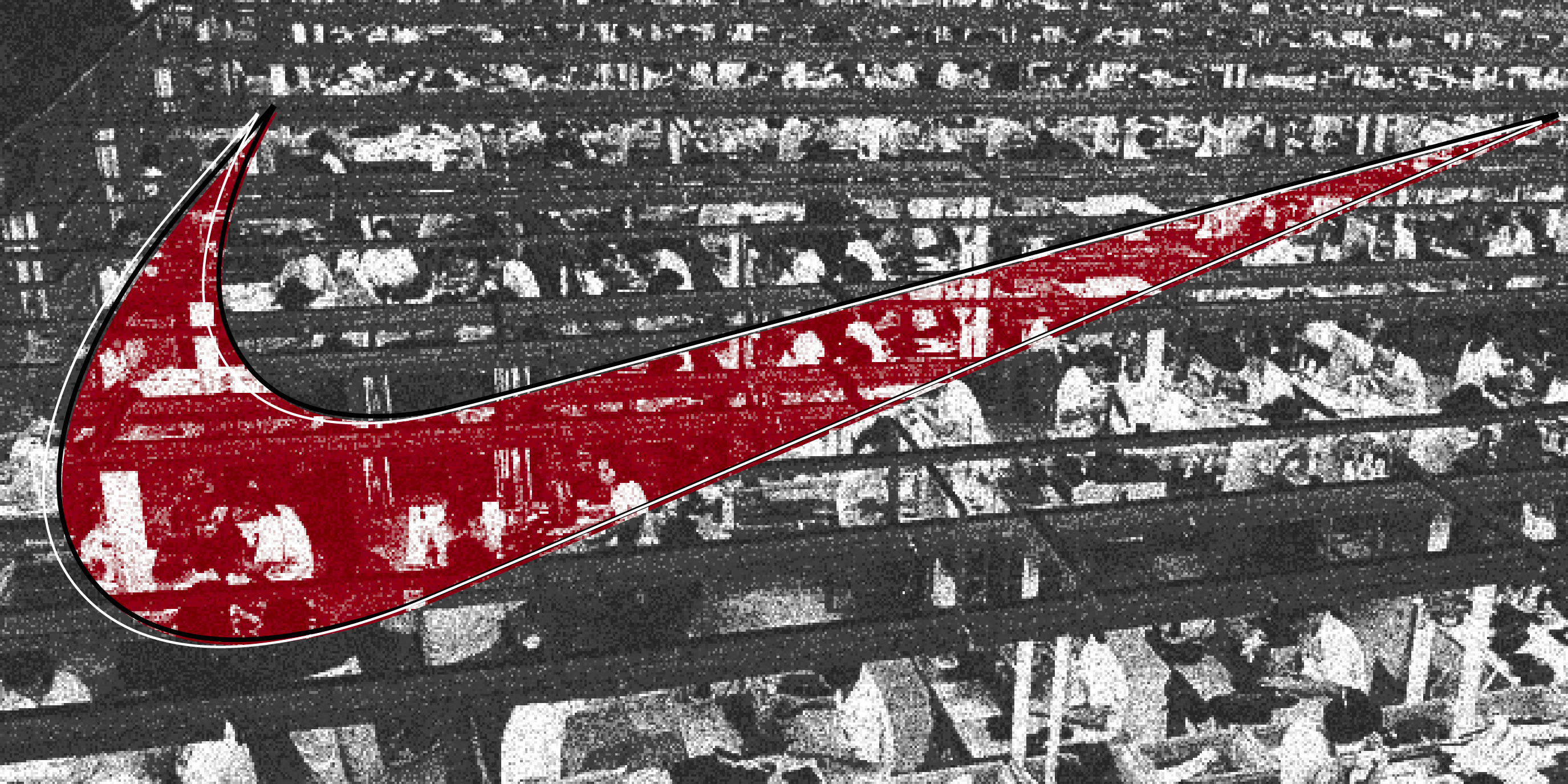It’s Time to Stop Turning a Blind Eye Toward Sweatshop Labor

Image by Jenny Dodge.
When Nike released its controversial advertisement featuring Colin Kaepernick, the NFL player who began kneeling during national anthems to protest racial injustice, people were quick to applaud the company for its dedication to social justice. While it is important for us as a society to stand behind movements like Black Lives Matter, it is also time for us to break free of our naivete about corporate motives. The Kaepernick advertisement served corporate interests of profitability rather than real concern for social justice.
Similarly, “feminist” t-shirts bearing slogans like “Nasty Woman” and “Girl Power” are having a moment in the spotlight, yet many of these “progressive” shirts are manufactured in sweatshops. These situations reveal that liberal progressivism — a political ideology that focuses on government reform as a means of promoting human rights and freedom — is not free from imperial influence and continues to turn a blind eye toward many of the world’s injustices. We enable corporations like Nike to posit themselves as arbiters of social justice deserving of consumer dollars, while simultaneously relying on sweatshop labor.
Consumers’ blind trust and devotion toward corporate powers often stifle discussion of the issues with global labor systems. As U.S. citizens, we all benefit from imperialism on some level. The fact that we can walk into a Forever 21 and buy a shirt for $5 is a clear example of how we reap the benefits of America’s imperial strategies, whether we agree with them or not. We are hesitant to discuss issues such as sweatshops because it forces us to identify ourselves as a part of the problem. Although this humanitarian crisis may feel impossible to attack as individuals, a starting point is to begin discussion and education on the issue.
Sweatshops are characterized by harsh working conditions, including poor safety conditions, polluted or unsanitary environments, low wages, excessive hours, and verbal or physical abuse. Global companies became dependent on what essentially equates to slave labor toward the second half of the twentieth century. In the 1960s, wages in the U.S were high, unemployment was low, and there was a high demand for workers in manufacturing industries. However, at the same time, laissez-faire policies were growing in popularity and the globalization of capitalism was causing a drastic increase in international corporate competition.
This rise in market competition meant that businesses were prompted to find cheaper means of production in order to lower the cost of products and stay competitive in the global economy. This resulted in a major shift to foreign production through outsourcing. Since the 1960s, corporations have turned their manufacturing over to countries in the Global South, where labor is generally less regulated and pays lower — if any — minimum wage. Outsourcing allows corporations to produce goods for a fraction of the cost, drastically increasing their profit margins at the expense of workers.
Production is, therefore, a method through which the U.S. and Europe maintain colonial control over the global south. Countries with developed capitalist economies bring their manufacturing to formerly colonized countries. with more vulnerable economies and make them dependent foreign capitalist industry. This inhibits the growth of local business and leaves the labor force vulnerable to extreme exploitation with no other opportunities for employment.
Most of this manufacturing occurs in export processing zones (EPZ’s) which are exempt from international labor regulations that dictate minimum wages, maximum work hours, and safety conditions. Because of this policy loophole, companies are able to employ laborers for much lower than a living wage and force them to reach production quotas, regardless of hours worked. Additionally, health and safety conditions are deplorable, with The Guardian reporting that “more than 500 workers in four factories supplying to Nike, Puma, Asics, and VF Corporation were hospitalized” in a single year.
However, this is only the first layer of sweatshop injustice. Linda Lim, a professor of Corporate Strategy and International Business at the University of Michigan, describes the exploitation of labor in the Global South as an interplay between imperial and patriarchal exploitation. Imperial exploitation entails developed nations bringing manufacturing into the global south and paying workers much lower wages than they would in the U.S. or Europe for the same production output.
Patriarchal exploitation adds another level to this oppression. Lim refers to the predisposition of women to be in a position vulnerable to capitalist exploitation due to their oppression in patriarchal society. Women often have fewer opportunities for education or to gain marketable skills and are generally expected to provide free labor to family farms or care for children, leaving them with little opportunity to earn their own wages and have any economic mobility. This lack of opportunity and skill leaves women in a vulnerable position in which they have few options other than to take factory jobs. Women are unable to earn wages at home and are therefore forced to move into cities for factory work. Additionally, sweatshop labor often involves traditionally feminine tasks, such as sewing. Because of this, women make up 90% of all sweatshop workers in the global south.
Some economists use feminist rhetoric to argue that sweatshops provide a source of women’s liberation, as they allow women to earn their own wages and become more self-sufficient. However, the reality is that women end up working in sweatshops due to a lack of options and systematic imperialism and patriarchy rather than free will. In fact, most women who initially apply to factory jobs quit early on and return to agricultural jobs due to physical and mental stress brought upon them by factory labor. There is an important distinction to be made here between empowerment and coercion. While women may choose sweatshop labor because it is more enticing than the rural alternative, that does not equate to liberation and empowerment but is rather of a lesser of two evils.
A vast majority of corporations are reliant on sweatshop labor, meaning that capitalist and consumer culture are deeply intertwined with this exploitation. Essentially, what would need to happen to eradicate sweatshop labor is national economic development in the Global South that strengthens local business and decreases dependence on global corporations, as well as a progressive movement towards gender equality. Transnational corporations also need to be held accountable for this exploitation via regulations by national governments and the U.N. There needs to be a drastic increase in corporate transparency enforced by international law.
Consumers are left trapped in a seemingly helpless state in which many of us depend on slave labor products with little authority to effect change. I personally choose to refrain from purchasing items from companies that do not provide living wages to employees, such as Nike, Forever 21, and other fast-fashion corporations. However, being able to do this is a privilege. Consumer goods that are ethically produced are typically more expensive and therefore not an option for everyone to buy.
One thing everyone can do regardless of their financial situation is simply to be aware of where their clothes are coming from. The vast majority of people simply don’t acknowledge the reality of the sweatshop labor that produces the goods they consume.
While ethical responsibility ultimately lies on corporations and the governments that regulate them, consumers are not powerless in trying to end the exploitation of workers in the Global South. Consumers need to have a more critical perspective on corporations in order to hold them accountable for their global impact. While making informed purchasing decisions and supporting companies that are transparent in their production is a step in the right direction, we ultimately need to push for the transformation of the systems of power that allow for this exploitation. This means putting pressure on the government to increase corporate regulation and advocating for a change in the way that modern industry functions.




